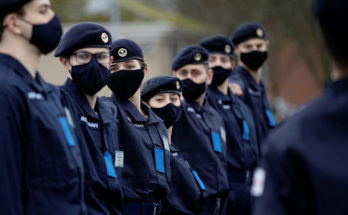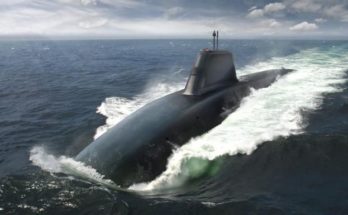
Moderator: Sylvia Pfeifer, Industry Correspondent – Financial Times
Speakers: Richard Berthon, Director Future Combat Air – Ministry of Defence
Herman Claesen, Managing Director – Future Combat Air Systems – BAE Systems
Brig. Gen. Luca De Martinis, 4th Department Director, Armament Programmes Coordination, Secretariat General of Defence/ National Armaments Directorate – Italian Ministry of Defense
Guglielmo Maviglia, Global Combat Air Programme Officer – Leonardo SpA
Takamasa Iba, Director, Aircraft Division – Acquisition, Technology & Logistics Agency, Japan Ministry of Defense
Hitoshi Shiraishi, General Manager, Integrated Defense & Space Systems – Mitsubishi Heavy Industries Ltd
During BAE’s Global Combat Air Program (GCAP) event at DSEI 2023, the spirit between the three partner nations – the U.K., France, and Japan – conveyed optimism and commitment. The highly anticipated panel represents the first time representatives from all three countries shared a public forum stage and discussed their program to field a sixth-generation fighter aircraft.
On the Importance of the Project
According to Richard Berthon of the U.K. Ministry of Defence, GCAP fills a critical military capability and strengthens the British industrial base. Berthon said 3,000 people in the U.K. alone are at work developing the British industrial skillset. While GCAP serves the independent sovereign interests of the partnering countries, it also promotes genuinely shared interests and values among the contributors.
Japan’s MoD representative, Takamasa Iba, added that GCAP is crucial to security. As an island nation that experiences missile launches regularly, Japan must have capable new fighters by 2035. Iba noted the Japanese military must launch hundreds of responsive scramble sorties per year to address these threats, implying the GCAP fighter would fill this mission role. Further, the project is strengthening a new generation of Japanese engineers to secure the defense industry’s future.
Brig. Gen. Luca De Martinis of the Italian MoD discussed GCAP as an operational and strategic need to expand technology and maintain advantage in the current environment. In response to the questioning of financial contribution, he assured the line of financing for GCAP is well-established in the Italian defense budget, with support set for the next 15 years.
On Anticipated Challenges for the 2025 Design Phase
Herman Claesen spoke of the need to unlock the digital framework opportunity for the design phase. Hitoshi Shiraishi identified the collaborative mixing of multinational project plans as a key factor in reaching the next milestone. French representatives discussed contract negotiations while expressing confidence in contractual progress.
On Exportability
Berthon cited the DSEI GCAP forum as evidence for the global community that the aircraft will be a strong purchase for customers. GCAP’s digital-first and open architecture approach represents the multinational effort to meet the demands of a future 2035 marketplace. Berthson said that Britain is confident in GCAP’s export success and expects to see a wide range of interested parties.
Japanese officials ensured listeners that the two ruling parties are discussing how export regulations will enable successful fighter sales and projected confidence in the market potential.
On Collaboration
Mutually beneficial collaboration ran as a common theme throughout the event. Shiraishi remarked that time zone differences present difficulties but also promote efficiencies, as end-of-day work in one part of the globe can be picked up and continued by partner teams just starting the day. The U.K., France, and Japan all reinforced their commitment to the project and its timeline, expressing confidence that strength lies in the diversity of perspectives and contributions. A notable quote emerged, “Friendships are being made.”
If you’re looking to gauge the health of the relationships, look to the past few years. Richard Berthon pointed to the tri-country efforts and progress during the unprecedented impact of the COVID-19 pandemic. To Berthon, this proves joint commitment.
The partner nations announced the signature of a new collaborative agreement outlining requirements for the concept phase earlier this week. GCAP’s focus on shared stakeholder commitment contrasts with recent dissent surrounding Germany, France, and Spain’s Future Combat Air System (FCAS). Considering Dassault CEO Eric Trappier’s public concern over Germany’s role in possible export sales of a future sixth-generation aircraft and a comparatively shaky history over the past several years, FCAS is likely to trail GCAP in development timeline and future success.
A former naval officer and helicopter pilot, Jon covers a range of Forecast International reports and products, drawing on his 10-year background in military aviation, operations, and education. His previous military assignments include multiple overseas deployments supporting operations in the Arabian Gulf, NATO exercises, and humanitarian missions. Jon’s work is also influenced by his time as a former Presidential Management Fellow and international trade specialist at the Department of Commerce.
Before joining Forecast International, Jon also served as an NROTC instructor and Adjunct Assistant Professor at the University of Texas, where he taught undergraduate courses on naval history, navigation, defense organization, and naval operations and warfare. A lifelong reader and learner, his academic and professional interests include aviation, political and military history, national defense and security, and foreign area studies.




